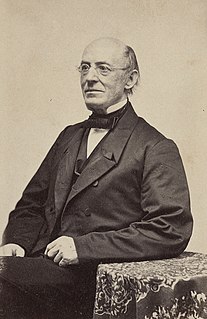A Quote by Thomas Clarkson
Should slavery be abolished there, (and it is an event, which, from these circumstances, we may reasonably expect to be produced in time) let it be remembered, that the Quakers will have had the merit of its abolition.
Quote Topics
Related Quotes
A wise man will not leave the right to the mercy of chance, nor wish it to prevail through the power of the majority. There is but little virtue in the action of masses of men. When the majority shall at length vote for the abolition of slavery, it will be because they are indifferent to slavery, or because there is but little slavery left to be abolished by their vote. They will then be the only slaves. Only his vote can hasten the abolition of slavery who asserts his own freedom by his vote.
In a word, we may reasonably hope for the virtual abolition of education when I'm as good as you has fully had its way. All incentives to learn and all penalties for not learning will vanish.The few who might want to learn will be prevented; who are they to overtop their fellows? And anyway the teachers-or should I say, nurses?-will be far too busy reassuring the dunces and patting them on the back to waste any time on real teaching. We shall no longer have to plan and toil to spread imperturable conceit and incurable ignorance among men. The little vermin themselves will do it for us.
It follows that the word probability, in its mathematical acceptance, has reference to the state of our knowledge of the circumstances under which an event may happen or fail. With the degree of information we possess concerning the circumstances of an event, the reason we have to think that it will occur, or, to use a single term, our expectation of it will vary. Probability is the expectation founded upon partial knowledge.
The South was at the point where the scale was tipping against slavery. It was slowly dawning on the plantation owners that slave labor was not economic, besides being morally wrong. Slavery was destined to be abolished, whether for economic reasons or moral reasons matters not, but the international intriguers were not going to wait for voluntary abolition to rob them of their trump card.
To rush in upon an event before its significance has had time to separate from the surrounding circumstances may be enterprising, but is it useful? ... The recent prevalence of these hot histories on publishers' lists raises the question: Should - or perhaps can - history be written while it is still smoking?
Colonization was the idea that once slavery ended African-Americans should be encouraged - or required, in some people's view - required to leave the country. It's part of an attitude toward the abolition of slavery which says America should not be a slave society, but it can never be a multiracial society. You can never have free black and white people living together.
There is nothing in the nature of a miracle that should render it incredible:;: its credibility depends upon the nature of the evidence by which it is supported. An event of extreme probability will not necessarily command our belief unless upon a sufficiency of proof; and so an event which we may regard as highly improbable may command our belief if it is sustained by sufficient evidence. So that the credibility or incredibility of an event does not rest upon the nature of the event itself, but depends upon the nature and sufficiency of the proof which sustains it.
It is certain that success naturally confirms in us a favourable opinion of our own abilities. Scarce any man is willing to allot to accident, friendship, and a thousand causes, which concur in every event without human contrivance or interposition, the part which they may justly claim in his advancement. We rate ourselves by our fortune rather than our virtues, and exorbitant claims are quickly produced by imaginary merit.






































